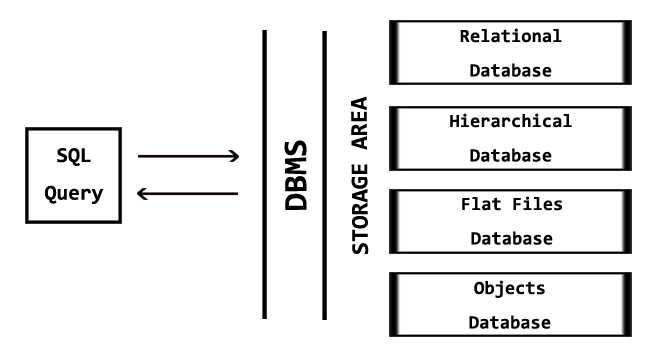What is a Database?
A Database is a collection of related data organized in a way that data can be easily accessed, managed and updated. Database can be software based or hardware based, with one sole purpose, storing data.

DBMS
A DBMS (Database Management System) is a software that allows creation, definition and manipulation of database, allowing users to store, process and analyzing data easily. DBMS provides us with an interface or a tool, to perform various operations like creating database, storing data in it, updating data, creating tables in the database and a lot more. Here are some examples of popular DBMS used these days: MySql, Oracle, SQL Server, IBM DB2, etc.
The DBMS is perhaps most useful for providing a centralized view of data that can be accessed by multiple users, from multiple locations, in a controlled manner. A DBMS can limit what data the end user sees, as well as how that end user can view the data, providing many views of a single database schema. End users and software programs are free from having to understand where the data is physically located or on what type of storage media it resides because the DBMS handles all requests. Some popular database models below:
- RDMS (Relational database management system)
- IMDBMS (In-memory database management system)
- CDBMS (Columnar database management system)
Advantages and Disadvantages:
Using a DBMS to store and manage data comes with advantages, but also overhead. One of the biggest advantages of using a DBMS is that it lets end users and application programmers access and use the same data while managing data integrity. Data is better protected and maintained when it can be shared using a DBMS instead of creating new iterations of the same data stored in new files for every new application. The DBMS provides a central store of data that can be accessed by multiple users in a controlled manner. But, as you know, every coin has two sides so DBMS also has some disadvantages too. Here's a side-by-side representation of the advantages and disadvantages of a Database Management System (DBMS):
| Advantages | Disadvantages |
|---|---|
| Data Integrity and Accuracy: Ensures accurate and consistent data. | Cost: Implementing and maintaining a DBMS can be expensive. |
| Data Security: Provides authentication and authorization. | Complexity: Requires specialized knowledge and skills for management. |
| Data Independence: Abstracts physical storage details for flexibility. | Performance Overhead: Introduces some performance overhead compared to direct. |
| Concurrency Control: Manages concurrent access for consistency. | Data Security Concerns: Improper configuration or vulnerabilities can lead to security breaches. |
| Query Optimization: Optimizes queries for efficient data retrieval. | Potential for Database Failure: Susceptible to crashes or corruption, leading to data loss. |
| Centralized Management: Provides a centralized platform for easier control. | Learning Curve: Requires investment in training and education. |
Note: It's important to consider these factors based on the specific needs and context of the project or organization when deciding whether to use a DBMS.
Category: Database
on: 01 Dec 2018
on: 07 Aug 2023
Featured posts
You may like these posts.
Bootstrap loader - Bootstrap process in Windows OS:
Booting is a bootstrapping process that starts operating systems when the user turns on a computer. A Bootstrap Loader (BSL) is a small program but hard to code.

Crime through the Internet, Reasons & Prevention:
Any criminal activity that uses a computer either as an instrument, target or a means for perpetuating further comes within the ambit of cyber crime.

Types of Firewall - Packet, Application, Proxy, NGFW:
Firewalls are often categorized as either network firewalls or host-based firewall. Firewalls may also be a component of your computer's operating system.
What's Next?
We've now entered the finance section on this platform, where you can enhance your financial literacy.